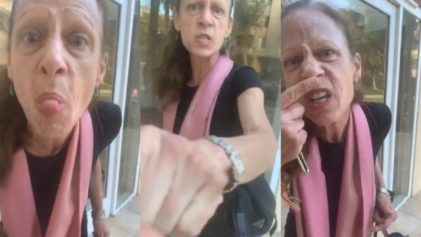When it comes to racism we always take a look after African Americans and other minorities who have been discriminated against, but rarely do we (or anyone else) take a look at racism through the eyes of a Caucasian person who decided to turn the mirror around on themselves.
A new argument is catching wind that as a whole, everyone should remember that no matter who you are you didn’t select your skin color. You didn’t choose to be in a group of people who are discriminated against daily, and you also didn’t choose to be a part of the race that is often portrayed as the only villain in racism.
By turning the mirror around, majorities are actually fuel more support for minorities who aren’t given equal opportunities simply because they didn’t win the “generic lottery.”
Cameron Russell, a beautiful commercial model for major brands including Calvin Klein and Victoria’s Secret, is the one who coined the term “generic lottery” in a recent CNN opinion piece.
The 25-year-old admitted that she doesn’t appreciate earning so many opportunities and more camera time than other models simply because she is white. In addition to finding it incredibly racist, she also finds it to be an insult to herself as well.
“The real way that I became a model is that I won a generic lottery, and I am the recipient of a legacy,” she explained. “What do I mean by legacy? Well, for the past few centuries we have defined beauty not just as health and youth and symmetry that we’re biologically programmed to admire, but also as tall, slender figures, and femininity and white skin.”
So while the gorgeous woman also has an honors degree from Columbia University, no one really sees her as an intelligent girl with a powerful platform. She’s just a pretty, white face – and that’s what society loves the most about her.
In fact, the Victoria’s Secret model may actually have a better way of spreading her message than even one of the top universities that is attempting to spread almost the exact opposite message.
The University of Wisconsin-Superior is moving forward with a rather controversial campaign called the “Un-Fair Campaign.”
While the theory behind the campaign is essentially the same as what Russell believed – white people are just the lucky ones, but that doesn’t mean they are okay with the way society is – their final messages still don’t agree.
The 25-year-old model felt as if all people could see when they look at her was her race and that’s why she was given more opportunities in life, but the University seems to be arguing that society actually doesn’t see “white” as a color and Caucasians can’t see racism.
“It’s hard to see racism when you’re white,” one of the thought provoking images reads.
The other images in the campaign feature Caucasians with words all over their faces that describe how they are “lucky that people see US, not a color.”
Honestly, the message of the campaign is a positive one. It’s encouraging the majority to not just be okay with being lucky – they need to speak out against racism and help put it to a stop.
The only problem with the campaign seems to be the many ways people can interpret the messages. Many people are reading the “It’s hard to see racism when you’re white” photo as an insult suggesting they haven’t been able to recognize or understand racism for all these years.
“To assume it’s hard for whites to understand racism is insulting to my intelligence,” said Ann Reyelts, a resident to the area. “I get what they’re trying to say, but I don’t think that’s the way to go about it.”
Perhaps the message was supposed to be that it is a difficult thing to see racism because they are aware of how unfair and unjust it is and sometimes it does hurt them as well.
The University has lost quite a bit of support for the campaign after the picture went viral, but they’re determined to proceed anyway – and they should.
Recent surveys revealed that the Duluth-Superior metro area is in serious need of an overhaul when it comes to how they treat minorities.
The area is over 90% Caucasians and a 2010 survey revealed “Duluth residents viewed the city as less hospitable to racial and ethnic minorities, immigrants, young adults without children, and talented college graduates looking for work than other comparable cities.”


